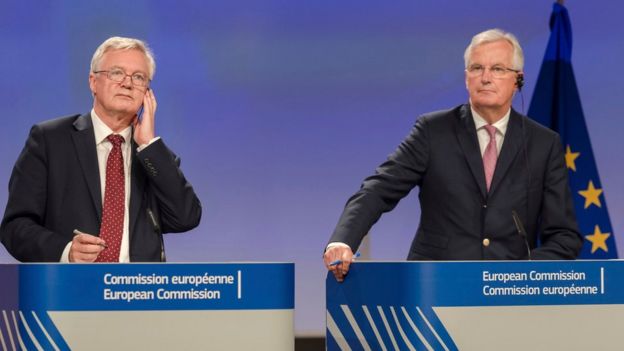The UK is to tell the EU it is "neither necessary nor appropriate" for the European Court of Justice (ECJ) to police their relationship after Brexit.
The government wants a "deep and special partnership" with the EU - while staying clear of the ECJ's jurisdiction, a policy paper will say.
There are plenty of other ways of resolving disputes, ministers say.
Theresa May has promised to take the UK out of the Luxembourg-based ECJ's jurisdiction after Brexit.
But the question of how future agreements between the UK and the EU will be enforced is proving contentious.
The European Court of Justice is in charge of ensuring member states abide by EU law.
Its rulings are binding on all member states, and it also settles disputes between countries and EU institutions.
After the UK voted to leave the EU last year, Mrs May promised to make the UK a "fully independent, sovereign country".
But pro-EU campaigners say the government made an "appalling error" by making leaving the ECJ a "red line" in Brexit negotiations, saying new courts will now be needed in all the areas it extends to, including trade, citizens' rights and security.
European Court of Justice
- Decides whether the institutions of the EU are acting legally, and settles disputes between them
- Ensures that the member states of the EU are complying with their legal obligations as set out in the EU treaties; and allows member states to challenge EU legislation
- Interprets EU law at the request of national courts
Brexit Secretary David Davis, who will resume negotiations with Brussels on 28 August, has spoken of the "arbitration arrangements" that will be needed in areas where the UK and the EU make new arrangements - but insists these will not involve the ECJ.
"If Manchester United goes to play Real Madrid, they don't allow Real Madrid to nominate the referee," he said last month.
Wednesday's publication - the latest in a series of papers setting out the UK government's stance on key issues - will say there are a "variety of precedents for resolving disputes that may arise between the UK and the EU" without the ECJ having direct jurisdiction.
These will need to include the free trade deal the UK hopes to strike with the EU to replace its membership of the single market.
On Monday, the president of the court of the European Free Trade Area (Efta) - which governs Iceland, Liechtenstein and Norway's relationship with the single market - suggested his institution could be used.
 PA
PA
But this could anger some Eurosceptic Conservative MPs, because the Efta court, also based in Luxembourg, tends to follow closely the ECJ with its rulings.
The ECJ has also emerged as the central stumbling block in reaching a deal on the rights of EU nationals after Brexit.
The EU side believes the ECJ should have a role in enforcing these rights - a proposal rejected by the UK.
The UK government said its paper on Wednesday would offer maximum certainty to businesses and individuals. It will also suggest that dispute resolution mechanisms could be tailored to the issue at stake in each agreement.
"It is in the interests of both the UK and the EU, and of our citizens and businesses, that the rights and obligations agreed between us can be relied upon and enforced in appropriate ways," a spokeswoman said.
"It is also in everyone's interest that, where disputes arise between the UK and the EU on the application or interpretation of these obligations, those disputes can be resolved efficiently and effectively."
Red lines 'blurred'
The pro-EU Open Britain campaign, which wants to remain part of the single market, claimed the government was paving the way for a "climbdown" by referring to ending the "direct" jurisdiction of the ECJ.
Speaking on behalf of the group, Labour MP Chuka Umunna said: "Nothing the government says it wants to deliver from Brexit - be it on trade, citizens' rights, or judicial co-operation - can be achieved without a dispute resolution system involving some role for European judges."
Sir Keir Starmer, Labour's shadow Brexit secretary, said: "The prime minister's ideological insistence that there can be no future role whatsoever for the ECJ or any similar court-like body risks preventing the deal Britain needs."
Liberal Democrat leader Vince Cable said Mrs May's "red lines are becoming more blurred by the day", saying the ECJ had "served Britain's interests well" and should not be "trashed".
The Institute of Directors called for "flexibility and pragmatism" when leaving the ECJ's jurisdiction.
"The emphasis here should be on ending its direct effect, not trying to throw off the influence of the court altogether," it said.